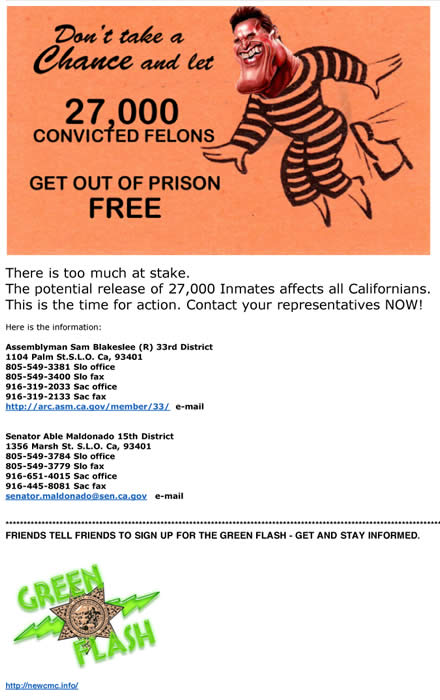Mediha Fejzagic DiMartino, Staff Writer
Created: 07/09/2010 03:20:00 PM PDT
As he listened to pension reform talks, David Sanchez' thoughts wandered off to 2005, when a fellow correctional officer Manuel Gonzalez was stabbed to death by an inmate at the California Institution for Men in Chino.
"Manny will never get his pension," Sanchez said. "Benefits should commensurate the danger we face. It's not a desk job."
Lately it appears that few have raised a question of what to do with state's custody staff that has been working without a contract since 2006.
While the rest of the state workers' unions have either reached tentative agreements or are involved in intense negotiations with the governor, California Correctional Peace Officers Association that represents Sanchez has been left out of the loop.
"We're not sure CCPOA is interested in bargaining yet," said Lynelle Jolley, spokeswoman for the Department of Personnel Administration.
But the union would "relish the opportunity to negotiate with reasonable people for a reasonable agreement of some kind," said Chuck Alexander, a vice president of CCPOA.
"We haven't been offered anything," he said. "We work behind prison walls, out of sight and out of mind and that's how we've been treated."
The current deadlock is nothing new. In its 2008 report, Legislative Analyst Office labeled the relationship between the state and CCPOA as "completely dysfunctional."
"This conflict also manifests itself at the bargaining table, and makes it more difficult to implement prison and parole system reforms," the report stated. "Union leaders regularly question administration officials' honesty and competence. Given the significant challenges facing California's prison system, this unproductive relationship hurts the state."
CCPOA members are working under implemented terms from the state after its leadership and the administration reached a bargaining impasse in 2007, said Jason Sisney, a director of state finance at LAO.
"We had to accept the entire package, all 350 pages, even if we don't like just one portion of it," Alexander said. "We asked them questions and they couldn't gives us answers."
The administration imposed its "last, best, and final offer" on CCPOA, which increased management control of the prisons. On LAO's recommendation, the Legislature refused to appropriate funds for the 5 percent raise proposed by the state at the time.
"We found in 2008 that officers' compensation levels were sufficient to allow the prisons to meet personnel needs as of that time," Sisney said.
The union has around 30,000 rank-and-file members - one of every seven state employees. But salaries and related expenses for CCPOA members and their supervisors "total about 40 percent of all such dollars paid from the General Fund," LAO stated.
That's because, unlike majority of other state employees, the personnel costs for correctional staff are funded almost entirely from the General Fund.
LAO estimated that during their last labor contract which spanned from 2001 to 2006, correctional officers received salary increases of about 34 percent, not including merit salary increases and overtime - more than twice as much as the increases for the average state employee over the same period.
On its Web site, the CCPOA advertises that the correctional officer's job has been called "the greatest entry-level job in California" and that officers can earn more than $73,000 a year, "not to mention benefits you just can't find in private industry."
And they earn every penny of it, Sanchez said.
"We deal with people the public is afraid of," he said. "It's a dangerous job. Not having a contract makes things uneasy, it bothers us. I understand that budget situation is difficult and pensions are expensive, but governor doesn't seem in a hurry to talk to us."
On Friday, Gov. Arnold Schwarzenegger thanked the six unions which have reached tentative labor agreements with his administration.
"They were smart enough to recognize that there is a problem and that maybe we are running out of money," Schwarzenegger said. "Pension money, the almost $7 billion that it costs taxpayers in public pensions is crowding out other programs. Why should the private sector, hard-working people out there that are paying into their own pensions should be responsible also to pay for public employees’ pension.”
One of the unions in governor's good graces is California Association of Highway Patrolmen. According to its contract posted on DPA's Web site, starting Oct. 31, new hires will receive pension benefits of 3 percent at age 55, instead of the current 3 percent at age 50.
The benefits will be based on highest consecutive 36-month salary instead of the current single-highest year and employees' pension contribution will go up from 8 percent to 10 percent of pay.
The CHP employees will also be exempted from the new furlough program and receive a pay raise commensurate with the increase in their pension contribution.
These numbers, more generous than what the other five unions have agreed to, look good to CCPOA.
"We'll take the CHP deal in a heartbeat, sight unseen," Alexander said.
But as budget continues to deteriorate, similar offers may not be available down the line.
"There is no money for pay raises," Jolley said. "What we need from the unions as in concessions can change as the circumstances get worse."
Still, CCPOA is willing to hold out for better terms.
"We are not in a bad shape right now," Alexander said. "When economy turns around and maybe we'll get another governor that views our profession a little bit more favorable than we've been viewed in the past. I'm not willing to take a bad deal for the sake of having a deal."






























No comments:
Post a Comment